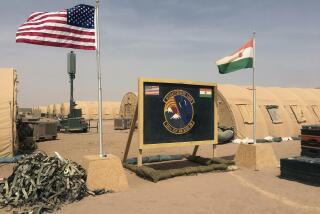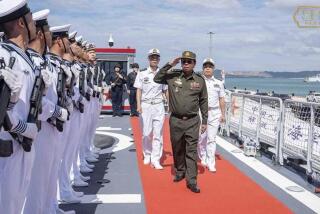Americans Bid Farewell to Last Philippine Base
- Share via
SUBIC BAY, Philippines — With tears, cheers and a 21-gun salute on the windy shores of this scenic port, the United States bade a final emotional farewell Tuesday to Subic Bay, long its largest overseas military base, and formally closed a remarkable chapter in both American and Philippine history.
At precisely 10 a.m., a Marine honor guard hauled down and crisply folded the American flag for the final time at the last U.S. base in America’s former colony.
Moments later, Philippine President Fidel V. Ramos helped pull the halyard to raise a giant Philippine flag on a gleaming new pole exactly 94 feet high--one foot for every year American troops have been based in his country.
“We felt very welcome here,” Adm. Robert J. Kelly, commander of the Pacific Fleet, told hundreds of dignitaries, families and townspeople during a 90-minute “disestablishment ceremony” under a steamy blue sky. But his deep voice cracked when he said his father will stay behind; he is buried with 17,200 other World War II dead in a U.S. military cemetery near Manila.
Several hours later, several busloads of wives, girlfriends and bar girls hugged final goodbys and wept openly as the last 532 Marines boarded the Belleau Wood, an amphibious assault ship.
“Bye-bye G.I.!” several women shouted, waving furiously from a bus. One skimpily clad woman danced seductively on the concrete pier, a final reminder of one of the Navy’s most notorious liberty ports.
“I’m gonna miss it,” Sgt. Mike Sink said sadly. “A lot of Marines don’t want to go.”
A dozen resident retired American servicemen, mostly overweight, wearing shorts and swigging beers, finally cast off the docking lines as the ship’s loudspeakers blared “God Bless the U.S.A.” As a helicopter clattered overhead, hundreds of sailors and Marines lined the long gray decks, and the ship slowly steamed across the sparkling bay en route to Okinawa.
“It’s a sad day,” said Jack Purdie, a grizzled, retired U.S. Navy postal clerk who wore a T-shirt emblazoned “Goodby Philippines” on the front, and “The Party’s Over” on the rear. “It’s still hard to believe.”
The day signified a dramatic change for two nations with unique historic ties. The United States seized the Philippines from Spain in 1898 and ruled it until independence was granted in 1946. But the bases, linchpin of postwar military strategy in the Pacific, inevitably tied America to Philippine events.
Probably no other nation played such a prominent role in American military history. The Subic Bay naval base figured in every war from the Boxer Rebellion in China to Desert Storm in the Persian Gulf.
Generations of leaders, including Presidents William Howard Taft and Dwight D. Eisenhower, served here. But the Philippine Senate rejected a new lease for Subic last year, and subsequent talks over a three-year pullout broke down over issues of national sovereignty.
In his speech, Ramos proudly declared the Philippines free of foreign troops for the first time since the Spanish colonized the archipelago in the 16th Century. “After 421 uninterrupted years, that epoch is about to be transformed,” the president said.
Ramos called for a review of the 1951 Mutual Defense Treaty, which commits the United States to defend the country from foreign aggression, and a clear explanation of America’s military commitment under the treaty. He also urged Washington to assist what he called the “throwaway children” of Olongapo, thousands of Amerasian children fathered by U.S. servicemen.
For the Americans, what officials called the largest withdrawal in Navy history has meant a sharp readjustment for the Pentagon. Subic’s deep-water port, jungle-clad mountains and a giant airfield at Cubi Point, itself carved out of a mountain, offered unparalleled training, resupply and recreation facilities for the 7th Fleet. More than 70% of Navy and Marine supplies for the Persian Gulf War, for example, came through Subic.
“It makes it a little harder now,” Kelly said at a news conference. About a third of the base’s 86 commands were moved to Guam, one was created in Singapore, and the rest have been eliminated or assumed by other bases around the Pacific, the admiral said. “Our biggest problem is training,” he added.
Rear Adm. Thomas A. Mercer, the former base commander, denied local news reports that massive amounts of hazardous waste and unexploded ordnance were being abandoned. He said 3 million pounds of hazardous waste were shipped back to America for disposal and that firing ranges and ammunition dumps were emptied.
“I think we’re leaving the cleanest bay in this part of the world,” Mercer said.
The military also leaves 1,876 air-conditioned homes, hundreds of office buildings and warehouses, a jumbo jet airport, a huge ship-repair complex, a 26-megawatt power plant, an eight-hole golf course and other recreation facilities--and what is probably the country’s largest tract of pristine rain forest.
The Philippine government hopes to lure international investors to Subic, a three-hour drive northwest of Manila, and turn it into a booming commercial complex of industrial estates, duty-free shops and holiday resorts. If the plan succeeds, officials say the area could be an engine of economic growth for the impoverished country.
Richard Gordon, mayor of neighboring Olongapo and head of the Subic Bay conversion authority, said he had just signed the first two deals.
A Taiwanese group will run four hotels on the base, he said, and an American company has agreed to set up a telemarketing operation and provide 6,000 jobs after two years. Another Taiwanese group, he said, had committed in principle to leasing 741 acres for the manufacture of consumer electronics, shoes, toys and other light industry.
“We’re going to sign contracts very fast,” he promised.
But for now, the base is mostly empty and guarded by unarmed volunteers. In an interview, Gordon worried openly that several hundred Philippine marines based at Subic may attempt to loot warehouses and homes after the Americans leave. So far, two of six people held for alleged looting were Philippine officers in charge of ensuring security. Others have illegally shot wild hogs and monkeys in the jungle, he said.
Until last year, Subic provided jobs for 32,000 Filipinos, and the American government was the nation’s No. 2 employer. Now most of the honky-tonk bars and tawdry brothels outside the giant base are closed, and the once-busy streets are eerily quiet. Even the Marines’ last night was a disappointment; the base had an 8 p.m. curfew.
“Without the Americans, we will be hungry,” said Annalyn Jagden, a 28-year-old bar girl sitting alone in the nearly deserted Johnnie O’s, one of the few remaining bars. “What will we do?”
More to Read
Sign up for Essential California
The most important California stories and recommendations in your inbox every morning.
You may occasionally receive promotional content from the Los Angeles Times.














